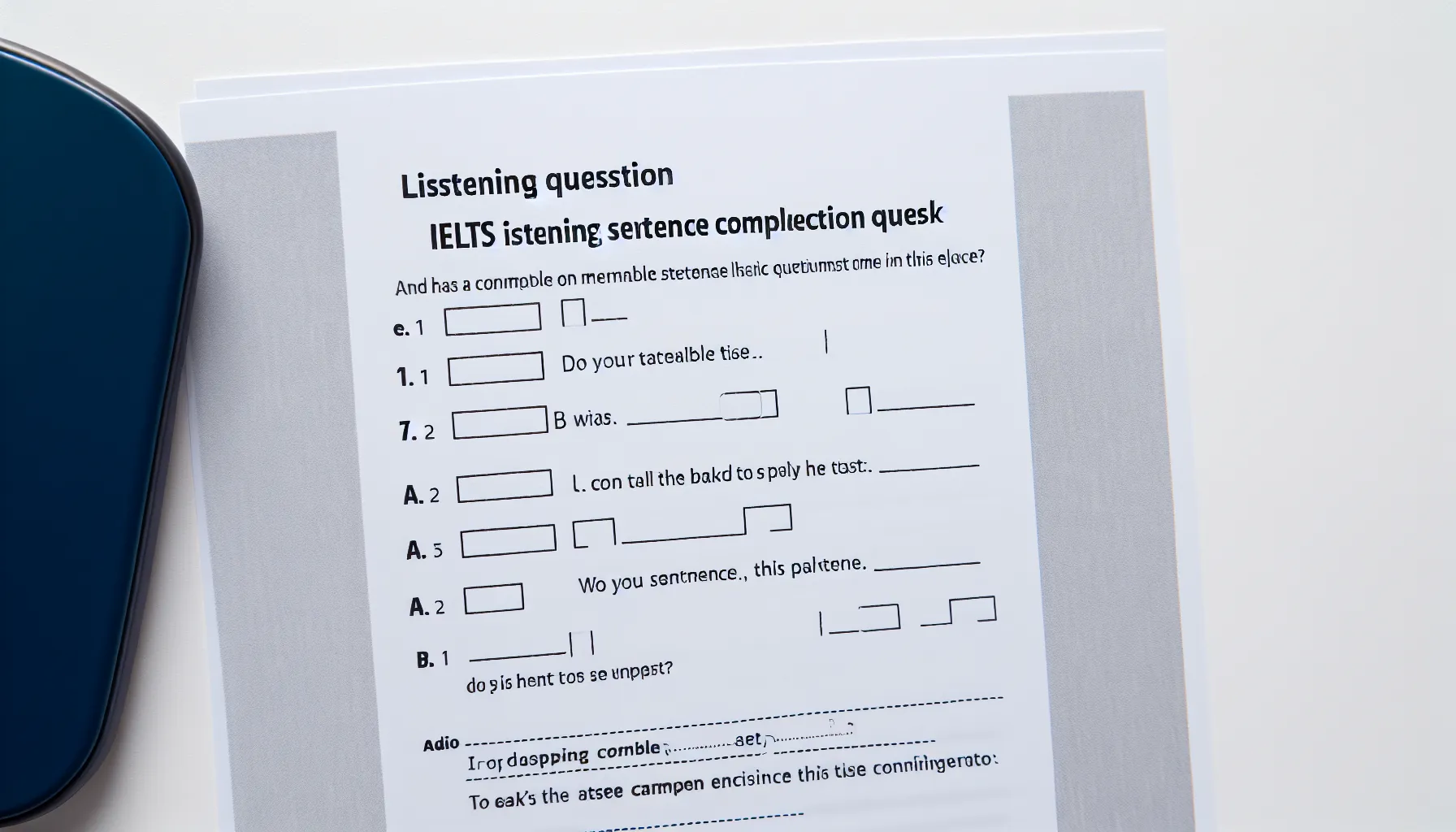Understanding Sentence Completion Tasks
Sentence completion is a common task type in the IELTS Listening test. It requires candidates to fill in gaps in sentences using information from the audio recording. This task assesses your ability to listen for specific details and understand the context of the information presented.
Key Features of Sentence Completion Questions
- Gaps are usually 1-3 words long
- Answers must be grammatically correct
- Spelling errors are penalized
- Words used to fill the gaps come directly from the recording

Essential Tips for IELTS Listening Sentence Completion
1. Read the Instructions Carefully
Before the audio begins, take time to read the instructions thoroughly. Pay attention to:
- The maximum number of words allowed for each answer
- Any specific instructions about word forms or numbers
Understanding these details will help you focus on the correct information during the listening.
2. Preview the Questions
Use the time given before the audio starts to:
- Read through all the sentences
- Underline key words that might help you predict the missing information
- Think about what type of word (noun, verb, adjective) might fit in each gap
This preparation will guide your listening and help you anticipate the answers.
3. Listen for Synonyms and Paraphrasing
The exact words in the questions may not be used in the audio. Be prepared to hear:
- Synonyms of key words from the questions
- Paraphrased versions of the information
For example, if the question mentions “a significant increase,” the audio might use phrases like “substantial growth” or “considerable rise.”
4. Follow the Order of Information
Sentence completion questions typically follow the order of information in the audio. This means:
- The answer to question 1 will come before the answer to question 2
- Answers will not be randomly scattered throughout the recording
Use this knowledge to stay focused and avoid missing important details.
5. Write as You Listen
Don’t wait until the end of the recording to write your answers. Instead:
- Write down potential answers as soon as you hear them
- Use pencil so you can easily make changes if needed
- Keep listening even as you write, to avoid missing subsequent information
This approach helps you capture information accurately and reduces the risk of forgetting details.
6. Pay Attention to Grammar
Ensure your answers fit grammatically into the sentences. Consider:
- Singular vs. plural nouns
- Verb tenses
- Articles (a, an, the)
For example, if the sentence reads “The project was completed in _____ months,” make sure your answer is a number that makes sense in context.
7. Be Mindful of Word Limits
Adhere strictly to the word limit specified in the instructions. If the question asks for “NO MORE THAN TWO WORDS,” answers like:
- “Correct: heavy rain”
- “Incorrect: very heavy rain” (exceeds the two-word limit)
Remember, hyphenated words (e.g., “well-known”) count as single words.
8. Practice Active Listening
Develop your active listening skills by:
- Focusing on the speaker’s tone and emphasis
- Noting transition words that signal important information (e.g., “however,” “in contrast,” “primarily”)
- Paying attention to repeated information, as it’s likely to be significant
These techniques will help you identify key details more effectively.
9. Review and Check Your Answers
If time allows after the recording ends:
- Review your answers for spelling mistakes
- Ensure each answer fits logically and grammatically in the sentence
- Check that you’ve followed all instructions regarding word limits
This final review can help you catch and correct minor errors that could cost you points.
Common Pitfalls to Avoid
1. Overthinking
Don’t second-guess yourself too much. If an answer fits grammatically and makes sense in context, it’s likely correct. Overthinking can lead to unnecessary changes and errors.
2. Ignoring Context
Always consider the overall context of the passage. An answer that seems correct in isolation might not make sense within the broader topic being discussed.
3. Missing Negative Statements
Be alert for negative statements or contradictions. For example, “The study did not support the hypothesis” is very different from “The study supported the hypothesis.”
4. Spelling Errors
Remember that spelling mistakes, even minor ones, will result in a wrong answer. If you’re unsure about the spelling of a word, try to think of an alternative that you can spell correctly.
Conclusion
Mastering sentence completion tasks in the IELTS Listening test requires practice, strategy, and attention to detail. By following these tips and being aware of common pitfalls, you can significantly improve your performance in this section of the exam. Remember to practice regularly with authentic IELTS materials, focusing on developing your listening skills and familiarizing yourself with various accents and speech patterns. With consistent effort and the right approach, you’ll be well-prepared to tackle sentence completion questions confidently on test day.